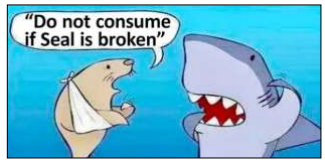Questões de Concurso
Para seed-pr
Foram encontradas 2.615 questões
Resolva questões gratuitamente!
Junte-se a mais de 4 milhões de concurseiros!
Read the text to answer.
A: So, I’ve decided I’m going to go to the bank and ask for a car loan.
B: That sounds like a good idea.
C: Well, you need a car.
B: Right.
A: Anyway, I was wondering if either of you would teach me how to drive.
B: Look, I’m very busy during the week, I'm trying to catch up with my deadline.
C: I’m in the same boat, but there must be a way...
A: What about the weekend? Say, Saturday morning? You both could take turns.
B: Fine with me!
C: Count me in!
The words reproducing pause, hesitation, redundancy, etc
which might or might not be present in abbreviated form
in the dialogue are:
Read the text to answer
There was a woman by the door. The woman was carrying a huge duffel bag. I had never seen her around, although she looked somehow familiar. The poor lady was obviously weary. I was not sure whether or not I’d address the stranger as she stared at me.
While highlighting the underlined words and conducting its
due analysis, it is consistent to assert that, in the text, they
illustrate the use of different.
Teacher: Where did you go on the weekend? Student: I went to the park. Teacher: You went to the park? How nice! What did you do? Student: I played soccer. Teacher: You played soccer. Who played soccer with you? Student: My friends from school, my team. Teacher: Your friends from school, your team? Did you like it? Student: I loved it. Teacher: You loved it. Great!
Among the resources of classroom management, teacher’s speech is considered a key element. The repetition produced by the teacher in the above dialogue signals:

In order to produce meaning out of the advertisements, one should activate relations of:

(Available in: https://examples.yourdictionary.com.)
Which figurative language device or “figure of speech” is found in the segment “Chocolate was her Achilles’ heel.”?
Analyse the image to answer.

(Available in: https://www.facebook.com/trafficawcamp.)
The public service announcement above deals with the necessary
precautions in traffic. The communicative situation emphasizes
the appealing function of the language for it is possible to verify
that the campaign’s social attribution is to:
Read the text and its references to answer.

(Author: Dan Puryear – CAD Applications Engineer. https://autodesk.
blogs.com/between_the_lines/2016/09/bad-poetry-slam-winner.html.)
Slam poetry is a form of performance poetry that combines the
elements of performance, writing, competition, and audience
participation. It is performed at events called poetry slams, or
simply slams. It is considered an artistic movement, a creative
way of telling stories, as well as a genre of poetry and spoken
word. Choose the item that matches the poem’s plot.
Read the text to answer.
Delta variant and low vaccine access
creates a third wave in Africa
Covid-19 cases are surging across the African continent, with more than twenty countries now in the grip of a third wave. Experts predict this wave will surpass case numbers seen in previous peaks. The speed and scale of Africa’s third wave is like nothing seen before, says Matshidiso Moeti, the World Health Organization regional director for Africa. The Delta variant is a big part of this potentially catastrophic surge, with over a dozen countries having detected cases. In Uganda and the Democratic Republic of the Congo, the Delta variant is now the most common in circulation. Stopping the spread and mutation of Covid-19 relies on populations being vaccinated. But access to vaccines in Africa is far too low. According to the latest WHO figures, only 1% of the African population has been fully vaccinated, compared to 50% of the population in high income countries like the UK and USA. Covid-19 vaccines, the world’s best hope to end the pandemic, are not being distributed fairly.
(Available in: https://shareverified.com. Adapted.)
Taking into account the elements constituting a journalistic text, we may infer that the author’s objective is to:
Read the text to answer.
Universal Declaration of Human Rights
Article 1
All human beings are born free and equal in dignity and rights. They are endowed with reason and conscience and should act towards one another in a spirit of brotherhood.
Article 2
Everyone is entitled to all the rights and freedoms set forth in this Declaration, without distinction of any kind, such as race, colour, sex, language, religion, political or other opinion, national or social origin, property, birth or other status. Furthermore, no distinction shall be made on the basis of the political, jurisdictional or international status of the country or territory to which a person belongs, whether it be independent, trust, non-selfgoverning or under any other limitation of sovereignty.
Article 3
Everyone has the right to life, liberty and security of person.
Article 4
No one shall be held in slavery or servitude; slavery and the slave trade shall be prohibited in all their forms.
Article 5
No one shall be subjected to torture or to cruel, inhuman or degrading treatment or punishment.
Article 6
Everyone has the right to recognition everywhere as a person before the law.
Article 7
All are equal before the law and are entitled without any discrimination to equal protection of the law. All are entitled to equal protection against any discrimination in violation of this Declaration and against any incitement to such discrimination.
Article 8
Everyone has the right to an effective remedy by the competent national tribunals for acts violating the fundamental rights granted him by the constitution or by law.
Article 9
No one shall be subjected to arbitrary arrest, detention or exile.
(Available in: https://www.un.org/en/about-us/universal-declarationof-human-rights. Adapted.)
The teacher introduces the topic of past verb forms by means of informal conversation asking students about activities they performed on the last weekend (it is useful to know that the past tense of regular and irregular verbs has already been studied in other previous classes). Then he/she presents students a text, in the genre interview, which students should silently read and employ to fill in the individual chart that they have just been given. The students are told to pay close attention to verb use in the text, so that the chart should be filled with regular and irregular verbs which appear in the text in their past form. Students are also told that not all of the blanks in the chart would be filled. Afterward there will happen the sharing and discussion of the collected information.

Choose the micro ability related to the purposes of reading, which the activity specifically seeks to improve.
Examine the image to answer.

(Available in: https://www.researchgate.net.)
The handout sentences
1.A – Do you know Valen’s address? 1.B – Do you have permition to address President Biden? 2.A – Dishonesty is a common attribute of politicians. 2.B – That quote is attributed to Bob Dylan. 3.A – We aren’t happy with your conduct. 3.B – He was asked to conduct the philarmonic orchestra. 4.A – The content of your essay is fine, the structure is not. 4.B – She seemed very content while reading the message. 5.A – The army marched through the desert. 5.B – If you desert the army you will be in big trouble. 6.A – What is that object over there? 6.B – Would you object if I opened the window? 7.A – The project should be completed next month. 7.B – We could project the film on the wall.
Choose the item that justifies the use of the pairs of sentences for oral practice.

(Available in: https://www.reddit.com.)
Linguistic knowledge strengthens by means of language practice, together with analysis, and insight about its use, always considering context in articulation with reading, writing, and speaking. Having observed verbal and non verbal data in the featured image, it is possible to state that the building of humor is based on:
1. Hacer novillos. 2. Empinar el codo. 3. Tener mala pata. 4. Hacer vista gorda. 5. Echar tierra en algo.
( ) Persona desafortunada. ( ) Fingir que no ha visto. ( ) Encubrir un hecho feo. ( ) No asistir a la clase. ( ) Ingerir mucho alcohol.
I. No dormiré ________ que termine el trabajo. II. Salí de casa ________ las ocho, creo. III. La calle sigue ________ aquí. IV. Gire ________ la derecha para llegar a la plaza. V. ?________ dónde estaba la playa?
